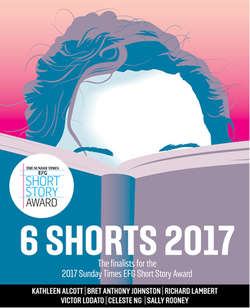Читать книгу Six Shorts 2017: The finalists for the 2017 Sunday Times EFG Short Story Award - Victor Lodato - Страница 7
ОглавлениеHalf of What Atlee Rouse Knows about Horses
By Bret Anthony Johnston
His daughter’s first horse came from a travelling carnival where children rode him in miserable clockwise circles. He was swaybacked with a patchy coat and split hooves, but Tammy fell for him on the spot and Atlee made a cash deal with the carnie. A lifetime ago, just outside Robstown, Texas. Atlee managed the stables west of town; Laurel, his wife, taught lessons there. He hadn’t brought the trailer – buying a pony hadn’t been on his plate that day – so he drove home slowly, holding the reins through the window, the horse trotting beside the truck. Tammy sat on his back singing made up songs about cowgirls. She named him Buttons. No telling how long he’d been ridden in circles at the carnival. For the rest of his life, Buttons never once turned left.
A year later, days after Hurricane Celia hit and everyone was digging through soggy debris for ruined photo albums and missing jewellery, an old woman from Corpus called Atlee about a chestnut mare. It wasn’t hers. She’d found the horse standing in her fenced backyard, soaked to the bone and spooked. “I think the storm dropped her here,” she said. He drove out and threw a rope not around the mare’s neck but her hoof, then coaxed her into the trailer with quiet talk and sugar beet. He ran an ad in the paper, hung signs in the feed stores, called every rancher he knew. He named her Celia and she turned out to be as fine a horse as he’d ever seen, smart and sure-footed. No one ever claimed the old girl. Not something he’d been able to parse.
The most beautiful thing he’d ever seen were the wild horses in Arizona. He’d gone to deliver Celia to a couple in Phoenix; they needed a companion horse for an old blue roan that was cribbing and stall-walking. Atlee was going to miss her and that must have been evident because after supper, a ranch hand said he knew something that would cheer him up and they drove out to the Salt River. Nobody knew how long the herds would survive. The state considered them stray livestock and staged round-ups without notice or due process. But Atlee saw a hundred horses that first evening. He glassed the mesa with the ranch hand’s binoculars and found the animals in the orange dust. They pawed the ground and threw their heads. They clacked their teeth and nipped each other, bucked and gave playful chase. Wind lifted their manes and tails. They bit at each other’s knees and reared up and sniffed the air. When one of the stallions caught a scent, maybe of Atlee himself or the truck or the ranch hand’s cigar, they broke into a run like nothing he’d ever witnessed. The herd spread and gathered, spread and gathered, one tremulous and far-ranging body, until they came together in a gorgeous line, a meridian dividing before and after.
*
Atlee had read of US Cavalry riders being thrown when their horses saw herds of buffalo. Those horses had originally been used for hunting – they’d been taken from the plains Indians – and the whole of their lives had been spent bolting and surrounding animals so the hunters could spear them down. They couldn’t unlearn it, so when they saw buffalo, the horses exploded into runs that dumped uninitiated riders. Atlee liked the image of those men on their asses in the dirt, but he hated to think of the horses waiting in vain for the buffalo to fall.
“Or was it right that he wouldn’t turn?” Tammy said, fanning herself with an outdated magazine. They sat on a hot porch, rocking in chairs, hoping for a breeze. His daughter drove out to Seaside Acres every couple of weeks. Atlee was wearing his good denim shirt, a leather bolo tie, boots he’d shined this morning or last night or last week or not at all. He was 80 years old and his memory was mostly leaked out. He couldn’t remember how they’d gotten on the subject of Buttons. She said, “I thought he didn’t like to go right because he’d been going that way all those years.”
“Right was the only way he went. They have memories like elephants,” he said. “He just remembered turning the one way.”
“He was a mean little shit,” she said. “That’s what I remember. His hobby was clotheslining me with low branches. He liked that crippled boy more.”
“When this ends, sell the carousel horse to a collector if you don’t want it.”
“You say that every visit,” she said.
“Let people fight over him at an auction.”
“And you didn’t pay that man no money for Buttons,” she said. “That’s just the story we gave mama. You told him the horse was hurting, and you were confiscating it. You said you could do it one of two ways, but both ended with us taking him home.”
